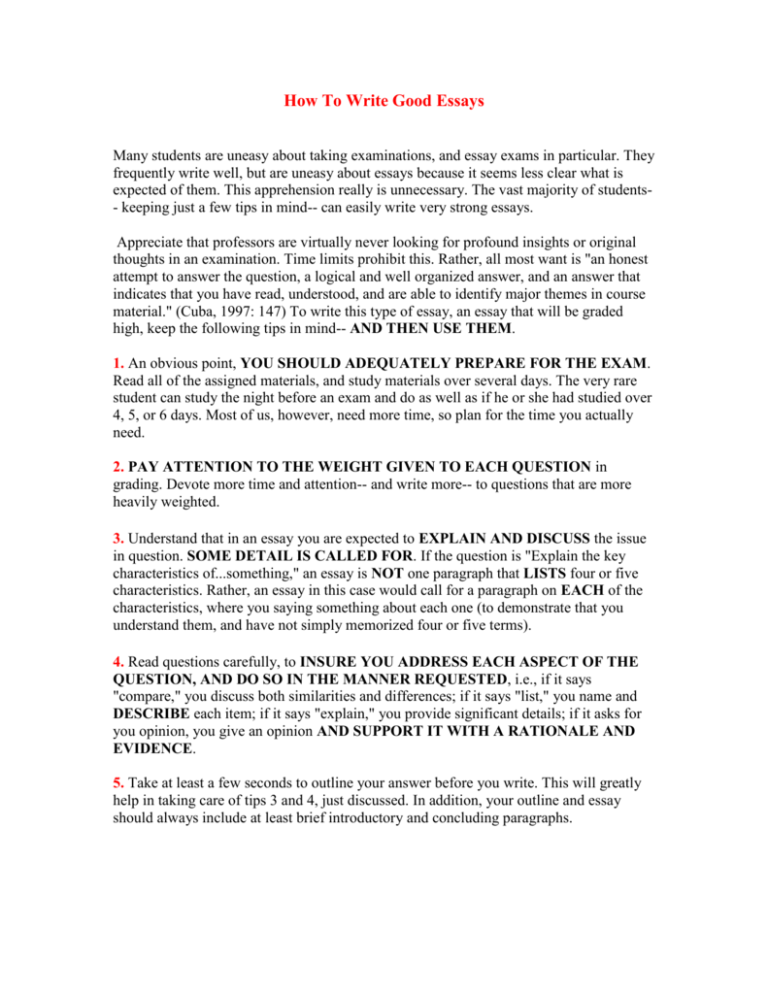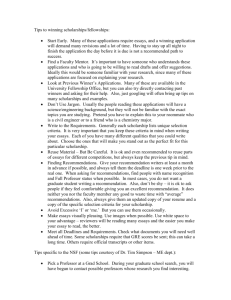How To Write Good Essays
advertisement

How To Write Good Essays Many students are uneasy about taking examinations, and essay exams in particular. They frequently write well, but are uneasy about essays because it seems less clear what is expected of them. This apprehension really is unnecessary. The vast majority of students- keeping just a few tips in mind-- can easily write very strong essays. Appreciate that professors are virtually never looking for profound insights or original thoughts in an examination. Time limits prohibit this. Rather, all most want is "an honest attempt to answer the question, a logical and well organized answer, and an answer that indicates that you have read, understood, and are able to identify major themes in course material." (Cuba, 1997: 147) To write this type of essay, an essay that will be graded high, keep the following tips in mind-- AND THEN USE THEM. 1. An obvious point, YOU SHOULD ADEQUATELY PREPARE FOR THE EXAM. Read all of the assigned materials, and study materials over several days. The very rare student can study the night before an exam and do as well as if he or she had studied over 4, 5, or 6 days. Most of us, however, need more time, so plan for the time you actually need. 2. PAY ATTENTION TO THE WEIGHT GIVEN TO EACH QUESTION in grading. Devote more time and attention-- and write more-- to questions that are more heavily weighted. 3. Understand that in an essay you are expected to EXPLAIN AND DISCUSS the issue in question. SOME DETAIL IS CALLED FOR. If the question is "Explain the key characteristics of...something," an essay is NOT one paragraph that LISTS four or five characteristics. Rather, an essay in this case would call for a paragraph on EACH of the characteristics, where you saying something about each one (to demonstrate that you understand them, and have not simply memorized four or five terms). 4. Read questions carefully, to INSURE YOU ADDRESS EACH ASPECT OF THE QUESTION, AND DO SO IN THE MANNER REQUESTED, i.e., if it says "compare," you discuss both similarities and differences; if it says "list," you name and DESCRIBE each item; if it says "explain," you provide significant details; if it asks for you opinion, you give an opinion AND SUPPORT IT WITH A RATIONALE AND EVIDENCE. 5. Take at least a few seconds to outline your answer before you write. This will greatly help in taking care of tips 3 and 4, just discussed. In addition, your outline and essay should always include at least brief introductory and concluding paragraphs. 6. In the words of Lee Cuba (1997: 151), and very importantly, "DON'T ASSUME THAT YOUR INSTRUCTOR WILL READ BETWEEN THE LINES of your examination. Although most instructors give students the benefit of the doubt in ambiguous situations, THEY ARE FORCED TO MARK EXAMINATIONS ON THE BASIS OF WHAT HAS BEEN WRITTEN, not on what might have been written. They will not assume that you knew more about the question...or that you could have provided a relevant citation or example but chose not to do so." (emphasis added) Students lose relatively few points for including incorrect information in essays; they lose most points for leaving out relevant information. When information is left out of an essay, it may be that the student knows the information but chose not to write it down, or it may be that he or she simply doesn't know the information. There is no way any professor can discern which is true, and so all that can be graded is what is actually on the paper. When writing, therefore, err on the side of including too much rather than too little information. 7. While erring on the side of too much information, remember that this only applies to relevant information—relevant to the specific question asked. Do not tack a “everything but the kitchen sink” approach, writing anything and everything you can think of, no matter how tangential. Even if the correct information is in there somewhere, no one wants to read through mounds of extraneous stuff to try and locate the relevant bits of information 8. MAKE YOUR ESSAYS PRESENTABLE. At minimum, use proper grammar and spelling, complete sentences, and paragraphs. Beyond this, and understanding that there are time limitations, make it as legible as possible-- write as neatly as possible, use margins, and leave some space between your answers. FOLLOWING THESE SEVEN SIMPLE TIPS WILL MAKE IT VERY LIKELY THAT YOU WILL WRITE HIGH QUALITY ESSAYS AND RECEIVE THE HIGH GRADES YOU WANT (AND WILL DESERVE). Reference: Cuba, Lee. A SHORT GUIDE TO WRITING ABOUT SOCIAL SCIENCE, 3rd edition. New York: Longman, 1997










